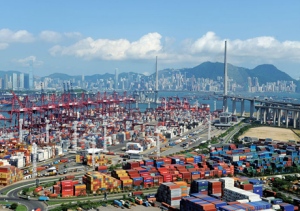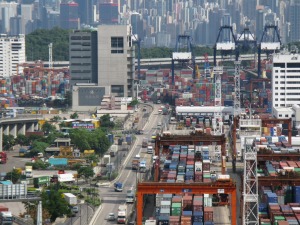Parliament is considering THE FREE ZONES BILL, 2012. Below here,am sharing my quick analysis on this bill.
Background
Free Economic Zones are designed areas which companies are taxed very lightly or not in order to encourage economic activity. Free trade zones are designated areas in which goods may be landed, handled, manufactured or reconfigured, and re-exported without the intervention of customs authorities. Only when goods are moved to consumers within the country in which the zone is located do they become subject to the prevailing customs duties.
They are normally established around major sea ports, International airports and national frontiers-areas with many geographic advantages for trade. Such free zones in Africa include; Misrata Free Trade Zone(LIBYA),Bizerte and Zarzis in Tunisia,Kano Free Trade Zone in Nigeria, among others. Kenya too has a number of such zones and according to the Kenya Export Promotion Zones Authority; the aim of the program is to transform the economy of Kenya from import substitution to a path of export led growth.
Introduction
This is a new Act, meant to provide for the establishment, development, marketing, maintenance, supervision and control of free zones. And to provide for the establishment of the Free Zones Bureau (FZB) as the authority responsible. Government introduced this bill with an intention of providing incentives to investors to provide increased export, increased foreign exchange earnings, employment opportunities, improved infrastructure facilities and enhancement of national human and capital resources.
This bill is also accordingly geared towards poverty eradication, promotion of government development policies and bringing Uganda’s legislation in line with her international obligations.
Part 111 of the Free Zone Bill (FZB) provides for the institutional framework and management of free zones.
Clause 11 there under provides for the appointment of the Executive director of the Bureau but doesn’t mention the composition and the term of office for the board members; whether one term or two more terms and of how many years.
Recommendation; The term of office of these board members should be provided for in this Act because this is a sensitive sector which attracts high level performance. There should therefore be a mechanism of reviewing and where necessary renewing the leadership of the board. They can be 4 year term renewable once.
Section 3 of the Uganda Investment Act 1991 (which is a sister legislation in as far as investment is concerned) provides for the composition of the board members and the term of their office.
“All members, other than the executive director, appointed by the Minister shall hold office for a term of not more than three years and shall be eligible for reappointment”.
The same provisions should provide for any other key officers of government that should be members of this bureau by virtue of the offices they hold in as far as the economy and investment in this country is concerned.
Justification; There is need to create certainty and coordination in the key government authorities that oversee the investment in this country. This will also encourage and give assurance to potential foreign investors who will be confident that government is involved and supportive.
Clause 17 of the UFZ provides for the bureau’s power to invest,
‘The Bureau may, with the prior approval of the Minister, invest, as it considers fit, any monies of the bureau not immediately required for use”.
The concern is that being the fact that the board is politically appointed by the executive; there authority may be abused by the appointing authority.
Recommendation; There is need to involve the Uganda Investment Authority in arriving at the decision to make investments by the bureau. Therefore investments by the UFZB should be made in consultation with the UIA and then approved by the Minister.
Justification; This is not only because the UIA has got a supervisory role on the activities of the UFZB but also because it helps not to expose the bureau to possible manipulation by the Minister (Executive),that may be interested in its funds as experience has shown in other sectors today.
Moreover it is expected that this industry will grow and definitely operate on a lot of finances and could become a possible target by the executive.
Clause 44 of the FZB provides for the Exemptions from taxes and duties on all export processing zone imported inputs. The issue of contention in this provision is that not everything that is brought/imported into the free zone is an input for production.
Recommendation; The bill should clearly state that other goods(inputs) imported into the export processing zone but not primarily for exclusive use in the production like chairs, beds, carpets etc. are not exempted from taxes and duties.
Justification; The sole purpose of creating the free zone is to boost production for export and so government’s incentives should be in as far as production is concerned. On the other hand, the government generally needs taxes to be able to put the necessary infrastructure needed for a successful free zone activity.
Need to provide for the guaranteed security of goods stored in a free zone so that where dutiable goods stored in a free zone are found to be missing without an acceptable explanation, the licensee be requested to pay the duty on the goods at the rate in force at the time in addition to any other penalty which may be imposed by the authority.
Justification; Unless we have such a provision in our law, we may experience several cases of deliberate loss of dutiable goods from the free zones with a sole plan of evading taxes on such goods. And the government will be loosing out not only on revenue but also can’t easily tress whether such items are not finding their way into the domestic market, something which is against the free zone spirit.
Providing for mechanisms of dispute settlement procedures; For disputes which may arise between a licensee in a free zone and government in respect of any activities in the free zone which may not be settled through mutual discussion. For disputes that may arise even among deferent companies and employees working within the free zone.
This should be in harmony with the rules of procedure for arbitration of the United Nations Commission of International Trade. In case of a foreign investor, within the framework of any bilateral or multilateral agreement on investment protection to which the Government and the country of which the investor is a national are parties. And also providing for what procedure takes precedence in case there is an agreement between the licensee and government on the method of resolving the dispute.
Need to provide for the requirement for work and resident permits for foreign nationals who wish to be employed in the free zones. This provision should indicate where such an application can be made and also provide for possible double taxation on the employee working in the free zone, by the Government of Uganda and the government of the foreign employee. In other jurisdictions, a foreign employee would not be taxed income tax if such an employee is also charged from his/her home country. And need for a provision to require the board to register and keep records of all employees in the free zone.
Clause 4 (2) of this FREE ZONES BILL 2012 provides that a free zone may only be established at a lake, river, port, airport, boarder point. But we may recall that not all regions of Uganda have got strategic areas like these and yet, its necessary that government develops all regions of the country equally. So in the interest of balancing development across regions of Uganda, we need to think of a possibility of having such big companies operate anywhere in Uganda but still under almost a similar arrangement of free zones.
On this issue, Malaysia introduced what it called, “Licensed Manufacturing Warehouse (LMW). Under this arrangement, A manufacturing company which exports at least 80% of its production and import the bulk of its raw materials/components qualified to apply for the LMW facility under the Customs Act 1967.(laws of Malaysia). Free Trade Zones were the strategy behind the economic boom of Malaysia from the 1970s.
Multi National Companies were encouraged into Malaysian Free Trade Zones and this accelerated the pace of industrialization which eventually saw the subsequent emergence of a strong Electronics industry, which has become the leading industry in the country’s manufacturing sector. Electronics sector alone had by 2008 created about 296870 jobs for Malaysians, accounting for about 28.8% of total employment in the manufacturing sector.
Justification; This will not only help in promoting regional development but also to enable each region take advantage of its comparative advantage. These factories can choose to be located and to produce according to the comparative advantage of that particular region. This will be done in efforts to encourage a more balanced dispersal of export-oriented industries across the country.
We may need a provision on Labor Utilization Relief. One way of dealing with the issue of high levels of Uganda’s youth unemployment after the introduction of Free Trade Zones into Uganda’s economy soon can be to introduce investor incentives in the form of Labor Utilization Relief, where the level of corporate tax exemption on the goods produced for export is linked to the number of Ugandan employees, that particular Multinational company is employing so that we can be able to attract labor intensive industries.
Justification; By the nature of economic activities happening in these free zones and being mostly foreign based companies, its possible that most of these companies will tend to bling in foreign workers. So we need to be reminded that youth unemployment in Uganda is now around 89%, which is very dangerous for our economy. So if we can have such a provision in the law, it will encourage the investors to employ more Ugandan workers with the hope of attracting more tax exemptions and this will in turn not just reduce on employment but will also promote development of our human resource/skilled labor force.
Recommendation: There is need to increase government involvement especially in the establishment of free zones by putting in place the necessary infrastructure. Elsewhere in the world where Free Zones have been successful. The companies in the Free Trade Zones have the dual benefits of enjoying the developed infrastructure at the site such as proper roads and drainage, telecommunication links and other utilities as well as third-party warehousing facilities.
The nature of the infrastructure needed for the proper utilization of these free zones must be very good and at international standards if really we are targeting foreign multi-national cooperations. No investor will be encouraged by a poor road network like the ones we have in Uganda today. This is because mostly it’s a busy road with heavy vehicles that are either bringing in raw materials or on transit taking goods for export.
Leaving this heavy responsibility of establishing a serious infrastructure in the hands of just the developer be by government abrogating on its noble duty of creating a reasonable environment for economic investment. So its recommended that this law should clearly indicate and encourage government’s minimum participation in this key sector.
Conclusion
Uganda’s economy will surely be transformed with the introduction of free trade zones. The zones will integrate the economy of Uganda into the global supply chain and attract export-oriented investments in the zones, thus achieving our economic objectives of job creation, diversification and expansion of exports, increase in productive investments, technology transfer and creation of backward linkages between the zones and the domestic economy of Uganda.
Byamugisha Moses
FDC youth Activist


Iduwat Ochom
January 20, 2015 at 1:35 pm
And “they” shamelessly accuse Opposition for not providing alternatives…
LikeLiked by 1 person